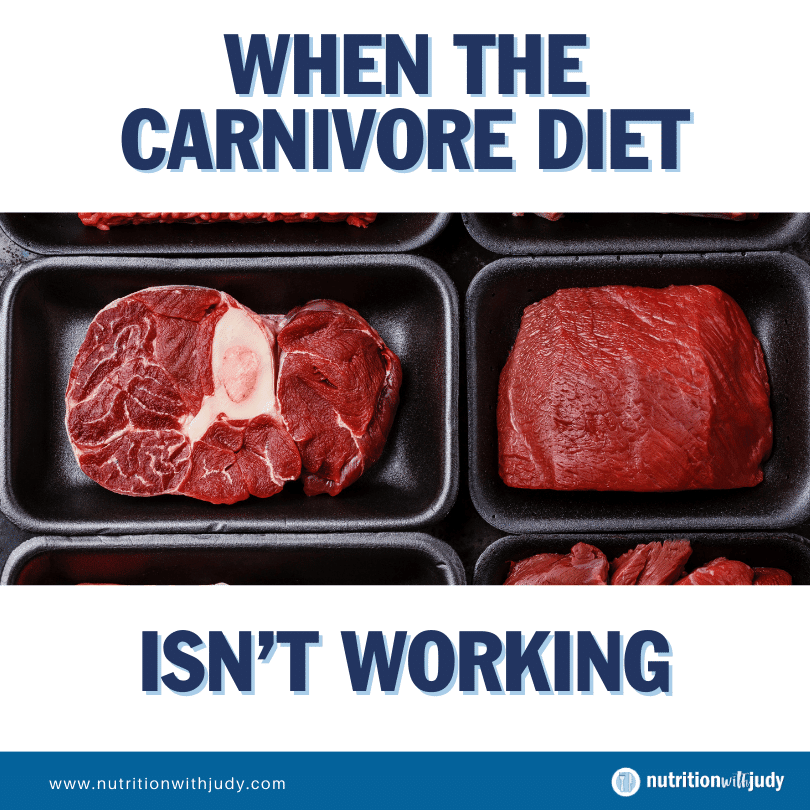

When the Carnivore Diet Isn’t Working


Starting the carnivore diet can be a life-changing journey, particularly for those struggling with chronic illnesses. However, it’s important to recognize that this path can come with hurdles and isn’t always straightforward for some. The diet’s efficacy depends on nuanced personalization and a deep understanding of one’s health.
While the carnivore diet has been a beacon of healing for many, providing substantial support for various conditions, it is not a one-size-fits-all protocol. For some individuals, despite the diet’s benefits, the quest to discover and address the root cause of their healing must continue. Taking up this journey requires patience, adaptability, and a commitment to holistic well-being.
What Is the Carnivore Diet?
The carnivore diet presents several customized plans catering to individual health objectives and dietary requirements, showcasing a range of options:
The Beef-Only Carnivore Diet
Primarily features beef to simplify elimination diets, ideal for addressing autoimmune or chronic conditions. For long-term health, incorporating diverse meats is advised for balanced nutrition.
The Lion Diet
A more restrictive variation, focusing on ruminant meats, salt, and water, the lion diet is suitable for initial elimination phases and especially beneficial for gut and autoimmune healing.
The Nose-to-Tail Carnivore Diet
Encourages consuming all animal parts, including organs, to ensure a broad nutrient spectrum. Special attention is needed for liver and kidney intake to prevent nutrient excesses, such as vitamin A toxicity.
The Meat-Only Carnivore Diet
Includes all types of muscle meats, excluding organs, dairy, and eggs, serving as a basic elimination diet for those tolerant of muscle meats.
The Zero-Carb Carnivore Diet
Targets zero to low-carb intake, incorporating dairy, eggs, and all meats, with optional seasonings, suited for those without autoimmune or severe chronic conditions.
The Carnivore Keto Diet
A low-carb, high-fat option that blends ketogenic and carnivore principles, incorporating certain low-toxicity plant-based foods for those with minor health issues.
The Carnivore-Ish Keto Diet
Offers greater flexibility by including more ketogenic foods while focusing on animal products, intended for metabolically healthy individuals without food addiction.
The Animal-Based Diet
A less strict carnivore variant, centralizing on animal products but allowing fruits, honey, and raw dairy, typically only suitable for highly metabolically flexible individuals and athletes. We don’t recommend this variation due to the risks of mixing fruit with high fat.
What Are the Benefits of the Carnivore Diet?
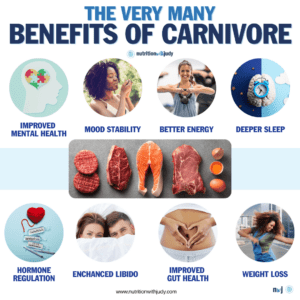

The carnivore diet offers many benefits, advocating for a return to a simpler, more ancestral way of eating that focuses primarily on animal-based products. This diet has been gaining popularity due to its straightforward approach to nutrition, focusing on foods that our bodies are naturally designed to digest and utilize efficiently. Here are the comprehensive reasons individuals are drawn to this way of eating:
Simplicity and Elimination of Processed Foods
The carnivore diet simplifies eating habits by eliminating processed foods, which often contain additives, preservatives, and sugar, contributing to a range of health issues from obesity to diabetes. By focusing on whole, nutrient-dense animal-based products, individuals reduce their intake of harmful ingredients and plant anti-nutrients.
Nutrient Density
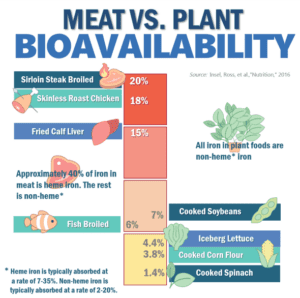

Animal-based products are rich in essential nutrients, including high-quality protein, fats, vitamins such as B12 and D, and minerals such as iron, zinc, and selenium. These nutrients are crucial for bodily functions, including muscle repair, brain function, and immune support.
Digestive Health
Many people find relief from digestive issues such as bloating, gas, and IBS symptoms on the carnivore diet. This improvement is often attributed to the elimination of fiber and plant-based foods that can irritate the gut lining or contribute to dysbiosis.
Autoimmune and Inflammatory Conditions
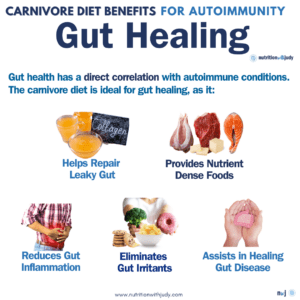

The diet’s elimination approach can benefit individuals with autoimmune conditions by reducing the immune system’s triggers. By cutting out potential irritants found in plant foods, such as lectins, oxalates, and nightshades, the diet helps in reducing systemic inflammation and autoimmune reactions.
Weight Loss and Metabolic Health
The carnivore diet can lead to weight loss and improved metabolic health by focusing on satiating foods that stabilize blood sugar levels, reduce cravings, and promote a healthier body composition. The high protein content also aids in preserving muscle mass during weight loss.
Mental Clarity and Energy Levels
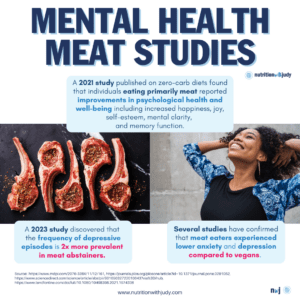

We have found that our clients have improved mental clarity and sustained energy levels, often due to stable blood sugar levels and the absence of fluctuating energy dips associated with high-carbohydrate diets. Mental health benefits are vast with this way of eating.
Satiety and Simplified Eating
Eating high-fat, high-protein foods can increase feelings of fullness, reducing the tendency to snack and simplifying meal planning. This can lead to a natural reduction in calorie intake without the need for counting calories or macronutrients.
Potential Reduction of Allergies and Sensitivities
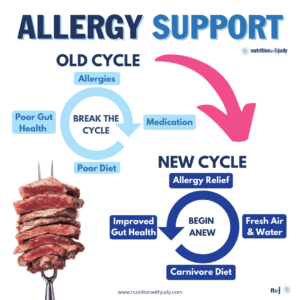

By removing most allergenic foods, including dairy, grains, nuts, and eggs, many individuals notice a reduction in allergies and sensitivities. Allergies and gut health go hand-in-hand, explaining how the gut-healing aspects of the carnivore diet can help support this.
Skin Improvements
Many individuals find that the carnivore diet can lead to clearer skin and improvement in conditions such as acne, eczema, and psoriasis. This can again be attributed to the gut-healing benefits of the carnivore diet due to the gut-skin axis.
Common Troubleshooting for Starting the Carnivore Diet
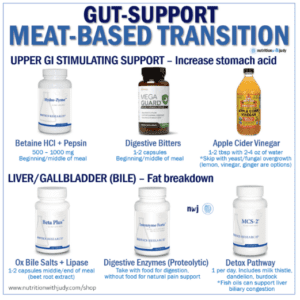

Transitioning to a carnivore diet can be a game-changer, but it can come with challenges for some. Understanding how to troubleshoot symptoms and adapt your approach is crucial for success. Here are the leading tips for navigating this transition effectively, keeping in mind that supplementation may be necessary, depending on your previous diet and specific health factors.
Be Patient with Your Digestive System
Transitioning from a high-fiber or low-fat diet to one rich in animal fats and proteins can lead to digestive changes, such as loose stools or constipation. This adjustment period is normal as your gallbladder and digestive system adapt to the higher fat intake. Supportive measures such as digestive enzymes or bile salts, particularly for those without a gallbladder or coming from a low-fat diet, can aid in this transition.
Try our Gut Healing Kit to help mitigate the symptoms during the transition.
Manage Electrolyte Balance
A carnivore diet drastically reduces carbohydrate intake, which can lead to shifts in fluid and electrolyte balance. Initially, you may need to supplement with electrolytes to alleviate symptoms such as fatigue, headaches, or muscle cramps. Over time, your body will adjust, and you can gradually reduce supplementation as you learn to listen to your body’s signals.
We always recommend sole water instead of playing mad scientist with various electrolyte products that may lead to electrolyte imbalance.
Supplement Wisely
Depending on the diet you’re transitioning from, you might need temporary supplemental support. For instance, if you’ve been consuming a diet low in certain nutrients or have specific health conditions, supplements such as digestive enzymes, hydrochloric acid, or fat supports may be necessary to support your body’s adaptation to a carnivore diet.
Introduce Foods Gradually
If you experience adverse reactions, consider introducing different animal foods gradually. This is especially true for individuals experiencing oxalate dumping symptoms. Slowly reducing high-oxalate foods and gradually transitioning to the carnivore diet can help reduce transition symptoms. However, some people prefer to jump all in so we always recommend taking into consideration what works best for you.
Listen to Your Body
The carnivore diet naturally brings out eating intuitively—consuming when hungry and stopping when full. However, it might take some time to recalibrate your hunger signals after years of following standard dietary guidelines. Pay attention to how different foods affect your energy, digestion, and overall well-being.
Adjust Fat and Protein Ratios
Finding the right balance of fat and protein is essential. Too much protein and not enough fat can lead to energy slumps and cravings. Experiment with your macronutrient ratios to find what keeps you satiated and energized. Learn more about best practices for adjusting macros here.
Stay Hydrated
Proper hydration is important, especially during the initial phase of transitioning to a carnivore diet. Drinking bone broth can provide both hydration and essential minerals that support digestive health and electrolyte balance. Individuals with histamine and mast cell activation issues often have to limit or avoid bone broth while healing.
When to Start Looking for Deeper Root Causes
For individuals who have dedicated themselves to the carnivore diet but still find their health concerns persisting beyond the initial adjustment period, it’s crucial to recognize when it may be time to dig deeper into underlying health issues. Typically, around the six-month to one-year mark, if notable improvements in health are not observed, this could signal the need for a more nuanced exploration of root causes that may be affecting one’s well-being.
Addressing these deeper health concerns often requires the guidance of a practitioner skilled in the carnivore diet and its impacts on various health conditions. These experts can provide personalized advice and adjustments that go beyond the general recommendations for the diet. They have the tools and knowledge to identify less obvious health issues that may not resolve through diet alone, such as hormonal imbalances, chronic infections, or gut microbiome dysfunctions.
Consulting with a carnivore diet expert can help in several ways:
- Tailored Nutritional Adjustments: Even within the carnivore diet, there’s significant room for personalization. A practitioner can help fine-tune the diet to address specific health issues, such as adjusting fat-to-protein ratios or incorporating certain types of animal foods that might be more beneficial for the individual’s condition.
- Supplementation Strategy: While the carnivore diet aims to reduce or eliminate the need for supplements, transitioning from certain diets or dealing with specific health conditions may require temporary supplementation. A knowledgeable practitioner can guide which supplements might be beneficial and when it’s appropriate to phase them out.
- Beyond Diet: Health is multifaceted, involving more than just nutrition. A holistic approach may include environmental considerations, stress management, sleep optimization, and physical activity adjustments. A practitioner can provide a comprehensive plan that encompasses these aspects for overall well-being.
- Advanced Testing and Analysis: Sometimes, uncovering the root cause requires specific tests that go beyond standard medical exams. A practitioner familiar with the carnivore diet can recommend tests that are more aligned with these nuances.
For individuals starting their journey on the carnivore diet, especially those coming from backgrounds of chronic illness or severe dietary restrictions, the support of a practitioner is invaluable. This expert guidance ensures that the diet not only serves as a tool for healing but also as a stepping stone towards uncovering and addressing deeper health concerns, ultimately paving the way for a more informed and healthful journey.
Things to Consider If the Carnivore Diet Isn’t Working
When navigating the carnivore diet, it’s important to recognize that not all health challenges may be resolved solely through dietary changes. While the diet can significantly improve many aspects of health, particularly through its anti-inflammatory benefits, there are instances where individuals may not experience the desired health improvements, even after meticulously following the diet and successfully troubleshooting common onboarding issues. This lack of progress, often encountered around the six-month to one-year mark, signals the need to investigate deeper underlying health issues.
One critical aspect to consider is that the solution is not simply to “carnivore harder” but to understand and address the root causes that might be hindering healing. In our clinical practice, we’ve observed that Chronic Inflammatory Response Syndrome (CIRS) and other environmental illnesses often play a significant role in the health of individuals who do not fully heal on a carnivore diet. These conditions can stem from various sources, including mold exposure, Lyme disease, and other chronic infections, which may not be directly addressed by diet alone.
Addressing these deeper health issues typically requires the expertise of a practitioner experienced in navigating the complexities of the carnivore diet alongside environmental illnesses. Such practitioners can provide targeted interventions, which may include advanced diagnostic testing, personalized dietary adjustments, environmental modifications, and specific therapeutic protocols aimed at addressing the root causes of illness.
It’s crucial for individuals to be open to exploring these potential underlying factors with professional guidance. This exploration can lead to a more comprehensive and effective approach to root-cause healing, beyond dietary changes alone. By recognizing the limitations of diet as a sole treatment modality and seeking expert advice, individuals can experience a more informed and holistic path toward health optimization, ensuring that all aspects of their well-being are addressed.
Find Practitioner Guidance for Root-Cause Healing
When starting on a journey towards root-cause healing, especially when navigating the complexities of the carnivore diet, the importance of finding trusted practitioner guidance cannot be overstated. The carnivore diet provides a powerful foundation for individuals seeking to address and support the healing of chronic health issues. However, the diet itself may not be a cure-all for everyone, particularly for those with underlying conditions that extend beyond nutritional factors.
The role of a knowledgeable practitioner in this context is invaluable. They bring a depth of understanding in identifying and addressing the root causes of health challenges that may be missed or oversimplified in a self-guided approach. A practitioner experienced in both the carnivore diet and holistic health can offer personalized recommendations that go beyond dietary adjustments, including targeted supplementation, lifestyle modifications, and specific therapeutic interventions.
Finding the right practitioner is essential for uncovering the unique root causes of one’s health issues. This professional guidance ensures that the carnivore diet is optimally tailored to support individual health needs, enabling a more effective and sustainable path towards healing and well-being.
Closing Thoughts On When the Carnivore Diet Isn’t Working
When navigating the carnivore diet, individuals may find challenges where despite strict following, expected health improvements are not achieved. This situation, often recognized around the six-month mark, brings forth the need for a deeper exploration of underlying health issues. The key message across discussions is that simply intensifying efforts in the carnivore diet (“carnivore harder”) is not the solution. Instead, the focus should shift towards understanding and addressing root causes that hinder healing.
Clinical practice insights reveal that Chronic Inflammatory Response Syndrome (CIRS) and other environmental illnesses frequently underlie persistent health issues in individuals on the carnivore diet. These conditions, not directly resolvable through diet alone, require the expertise of practitioners skilled in both the carnivore diet and environmental illnesses to offer targeted interventions.
Moreover, the transition to and troubleshooting within the carnivore diet involves patience, especially concerning digestive adjustments and managing electrolyte balance. Supplementation, wisely chosen under practitioner guidance, plays a critical role in this transition, depending on prior dietary habits and specific health conditions.
Overall, finding trusted practitioner guidance for root-cause healing emerges as a critical element. Such guidance ensures the carnivore diet is not only a supportive tool in one’s health journey but is also complemented by personalized strategies addressing deeper health concerns, leading to a more comprehensive approach to wellness.
Work With Our Trusted Carnivore Diet Functional Nutritional Therapy Practitioners
The Nutrition with Judy practice is honored to be a trusted carnivore diet practitioner support serving clients from around the globe. We’re passionate about helping our clients achieve root-cause healing in order to lead the best quality of life possible that’s nearly symptom-free. Our team is dedicated to helping our clients personalize their carnivore diets for optimal results. We welcome you to explore our free resources and are always available to support you through personalized protocols. Our Symptom Burden Assessment (SBA) is the perfect starting point for discovering your root cause and is required to work with our team— you can learn more in-depth about this powerful tool here.
Start your root-cause healing journey today and contact us any time with any questions or concerns.
DISCLAIMER: This content is for educational purposes only. While we are board-certified in holistic nutrition and are nutritional therapy practitioners, we are not providing medical advice. Whenever you start a new diet or protocol, always consult with your trusted practitioner first.






